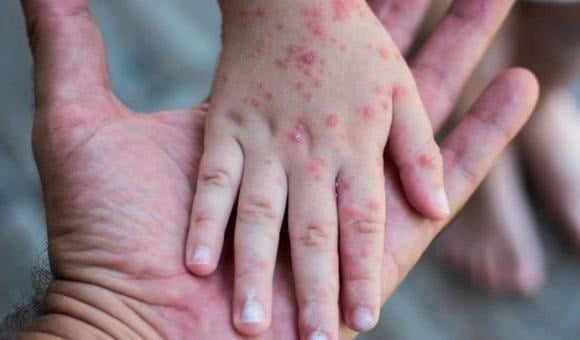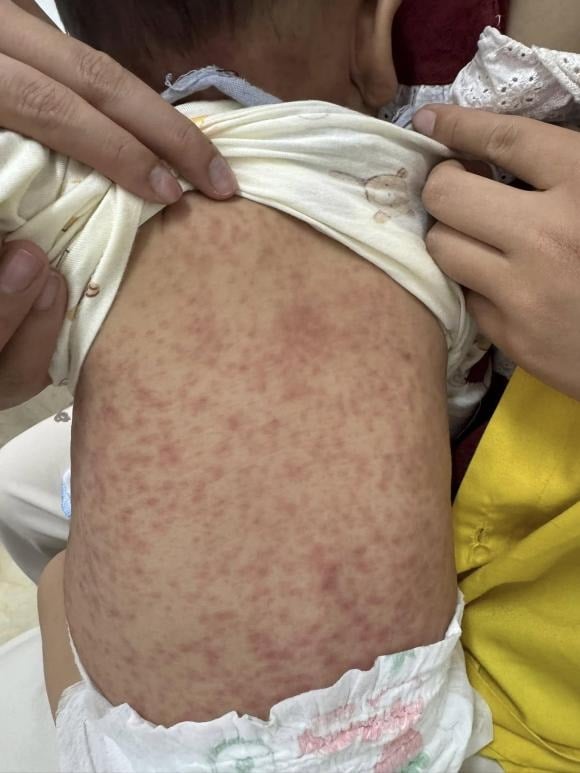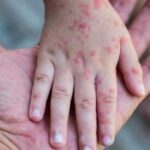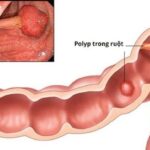Measles: Understanding the Risk of Reinfection and Effective Prevention
It’s understandable to wonder if it’s possible to contract measles again after being vaccinated and experiencing the disease once. According to the Hanoi Center for Disease Control and Prevention (CDC), the number of measles and hand, foot, and mouth disease cases in the area continued to rise in the first few days of April 2025, with over 400 cases reported weekly (from March 28 to April 4), the highest number so far this year.
Specifically, Hanoi recorded 206 cases of measles and 203 cases of hand, foot, and mouth disease. The CDC attributes most measles cases to individuals who have not been vaccinated or have not completed their vaccinations. It is predicted that Hanoi will continue to record more measles cases in the coming days.
Can measles reappear after the initial infection?
Measles is a highly contagious viral infection.
After contracting the measles virus, the incubation period typically ranges from 7 to 14 days. Initial symptoms of measles include:
A high fever, often exceeding 39 degrees Celsius.
Cough, sneezing, and a runny nose (due to inflammation of the upper respiratory tract).
Red, watery eyes (conjunctivitis).
After about 2-3 days, the patient will exhibit small white spots inside the mouth (Koplik’s spots), a distinctive sign that aids in the early diagnosis of measles.
Approximately 3-5 days later, the patient will develop a rash that is non-itchy, reddish-purple, and smooth, starting behind the ears and spreading to the face, chest, abdomen, and eventually the entire body. Once the rash clears, it leaves characteristic dark spots on the skin, known as “tiger skin” or “tiger stripes.”
It is a common concern whether an individual can get measles again after recovering from it. In reality, if you have been vaccinated or had measles before, you are highly unlikely to get infected again.

Most individuals develop lifelong immunity to measles after recovering from the disease or receiving the measles vaccine. However, a small number of people may experience a secondary measles infection due to a weakened immune system over time.
Caring for Patients with Measles
Currently, there is no specific antiviral medication for measles. If you suspect that a child has measles, take them to the nearest healthcare facility for an examination, and avoid crowded places to prevent the spread of the infection.
For patients with mild measles, home care is possible after a medical evaluation and instructions from a doctor. The care regimen includes the following steps:
Isolating the patient from healthy individuals, especially unvaccinated children.
Administering fever-reducing medication if the patient’s temperature rises above 38.5°C, as advised by a doctor.
Supplementing with vitamin A throughout the illness, as directed by a physician.
Breastfeeding for infants, offering more frequent feedings, and ensuring adequate fluid intake. Older children can be given a well-balanced diet and fruit juices. Soft, easily digestible foods are recommended, prepared without spicy ingredients, and divided into smaller meals.

Hygiene practices include cleaning the eyes, nose, and throat with saline solution three times daily. Bathe and clean the patient daily, avoiding prolonged baths to prevent chilling. Caregivers must wear masks and sanitize their hands before and after interacting with the patient.
If a child’s fever persists beyond 48 hours after the rash has disappeared, or if the fever returns after initially subsiding, seek medical attention immediately. Additionally, watch for severe coughing, lethargy, rapid breathing, or any other abnormal signs, and take the child to the hospital without delay.
In conclusion, measles is highly contagious, especially among children, which underscores the importance of prevention. The Ministry of Health recommends that children over nine months of age receive the measles vaccine or the combined measles, mumps, and rubella vaccine for effective protection. Ensuring proper nutrition to boost immunity and seeking medical attention at the first sign of measles are also crucial to preventing severe complications.






































